Hey. I gotta prediction. You wanna hear it? Tidewater Players production of Beautiful: The Carole King Musical is going all the way! Don’t write off this jukebox musical, featuring the music & lyrics of Carole King, Gerry Goffin, Barry Mann, and Cynthia Weil (and a book by Douglas McGrath) because its actually a heartwarming story that reads extremely well on an intimate stage, like the one Tidewater Players is working with at The Opera House. It may have been somewhat of a sleeper both on Broadway and when it toured the nation in all the big tour-accommodating houses, but that’s because at the end of the day it’s a simple and beautiful musical about four people writing songs and how their lives were shaped by their songwriting. And what better way to experience that than in an intimate and cozy staging? The nostalgia is popping, the hits are all the loves of iconic yesteryore and the show just comes to life in the capable hands of cast, crew, and creatives alike at this production. Directed by Dickie Mahoney with Musical Direction by Stephanie Carlock, and Choreography by Tigga Smaller, at the risk of sounding cliché because it is so much more than just its namesake, this production honestly and truly is beautiful.
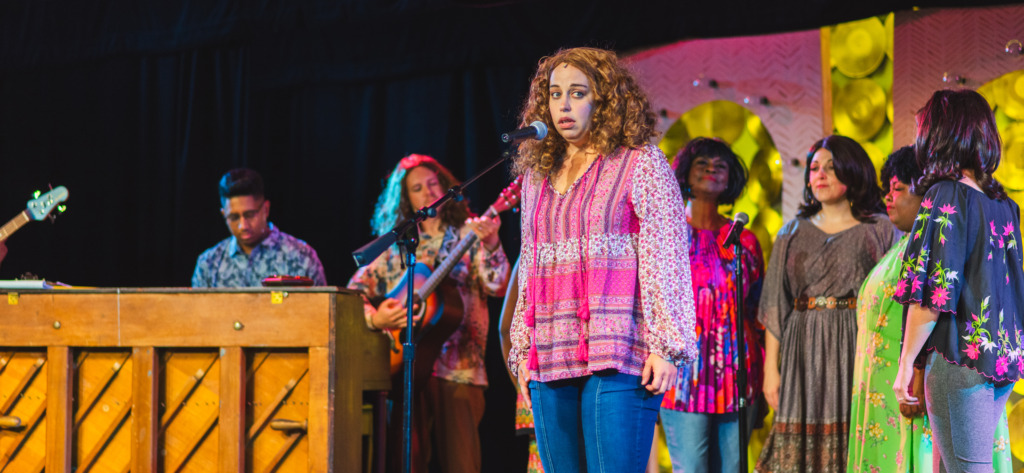
By far their best production this side of the pandemic, every little detail has just clicked into place— from the expedience of the scenic transitions to the impressive set to the upbeat dance routines to the shocking live-pit orchestra (an unheard of unicorn of mythical proportions when it comes to productions in the Opera House) everything in this production has come together to make a truly magical performance, once that the audiences will love. Dickie Mahoney— wearing all the hats and hairdos on the production team— serves as the show’s director, costumer, hair & wig designer, and set designer, but you’d swear he had a legion (and there’s a deep bench of set crew listed in the program) getting all of these pieces into place. The show’s backdrop is walls and walls of golden-painted records, and a layer of archways sits in front of that, allowing Lighting Designer William A. Price III to backlight these golden records in mood and emotionally appropriate lighting colors. (You see this a lot when the new songs being pitched by Carole and Gerry are finding the pathos of their footing; it’s an impressive scenic trick.)
What makes the set so impressive isn’t just that wall of golden records or even the slide-by expensive blank-white-wall canvas to showcase Carole and Gerry’s new suburban home, it’s the fact that all of the furnishings— that transform houses into recording studios and back in the whoosh of a stagehand— is mounted on rolling casters. Not only does this make the scenic transitions fluid and expedient, which is the ultimate service to the show’s overall pacing, but it gives you that sense of ‘time is flying’, which is appropriate given the way the libretto actually rolls through the years. You get these exquisite moments where Carole King is actually seated at the piano playing a song as a scene ends and they roll her out of the studio and int her apartment, or vice versa. It just has that Broadway-quality magic feel to it. Stage Manager Becky Flickinger and her run crew (Benjamin Marsh, Malia Williamson, Anna O’Dell, Sammi Flickinger) keep all of these scenic transitions moving with fluid consistency so you never feel like you’re languishing waiting for a scene change to occur.
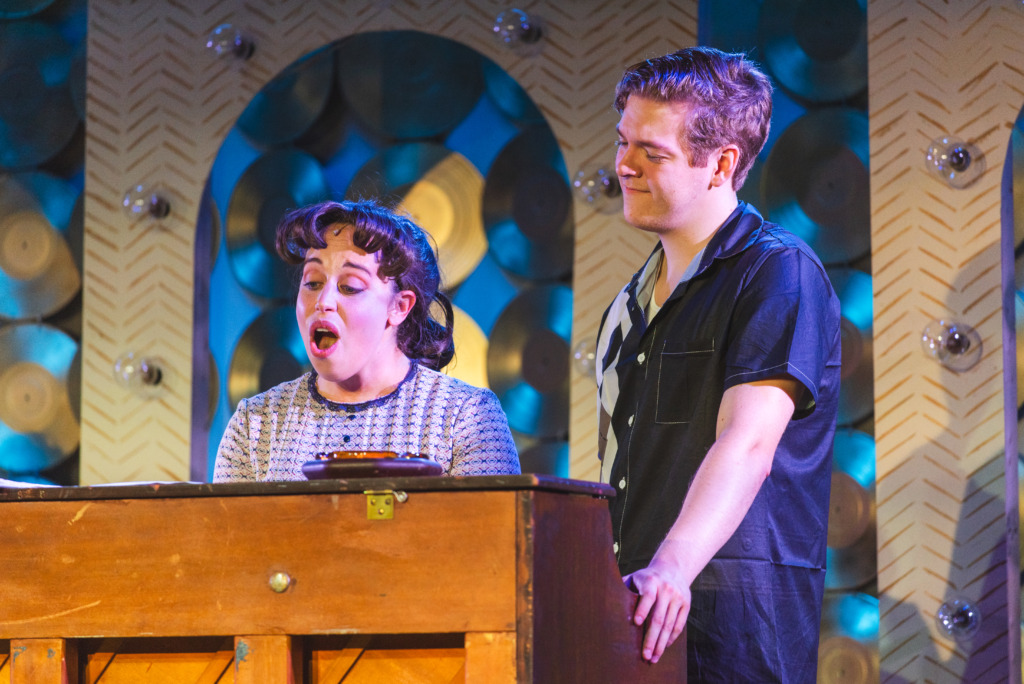
Director Dickey Mahoney has hit the jackpot with this particular tale, which is best experienced on an In intimate stage (cannot stress enough how detached and just ‘there’ it felt when on the larger touring stages like The Hippodrome, and The Eisenhower at The Kennedy Center.) Mahoney has framed the focus of the show to be split in equal parts; the music and its creation and the lives of those who were creating it. McGrath’s libretto makes that easier (without all the painfully obvious shoe-horns of some more recent jukebox musicals) but Mahoney finds the balance, putting the storytelling component of the show at the production’s forefront so you walk away feeling like you’ve experienced this emotionally charged narrative that really speaks to you on a heartwarming and endearing level.
Mahoney deserves extra praises for all of the wig and hairstyle work featured in this production (and we haven’t even gotten to the sleekness of the costumes.) Hairstyles from the late 1950’s through the early 1970’s, which are appropriate for the various ages and genders of the characters, fall right into line under Mahoney’s keen eye. And the costumes are a real delight— especially that magical transformation moment with Little Eva from bland babysitter to hit singing dancer star. The sparkly suit-jackets on The Drifters, the eye-blinding pink dresses for the Shirelles, and all of the groovy, low-key ‘welcome to the 70’s’ more hippy-flavored bohemian looks just fill out the aesthetic of this production divinely. There’s just a polished finesse to Mahoney’s sartorial selection and wig work that elevates this production quality to something extremely professional looking.

We need to sing the praises of The Pit. Not only because it’s a rarity, as the opera house is often not set up to contain a live orchestra, but because Musical Director Stephanie Carlock and her orchestra* of nine have a robust sound that really amps up the overall musical theatre experience. Their balancing, especially given the fact that they’re right at house-floor level in front of the stage, completely unmasked (meaning there are no sound dampers or walls/pit floors to keep their volume from over-playing the performers on stage), is pretty impressive. And the way they glide through these iconic musical numbers gives you the sensation of stepping back in time and being lively present in the recording studio with Carole King and all her friends. (If there’s a minor complaint about the show as a whole it’s the microphones and Dickson Teel’s sound balancing efforts with them. It’s like Steve McQueen in The Great Escape, he’ll make it work one day.) It’s a glorious experience to have a live orchestra pit for this show, and although Carlock and her team wasn’t needed for extreme vamping to cover scene changes (because this production’s run-team was that seamless) it’s nice to have them there for that just in case, as well as the un-replaceable feeling you get from experiencing musical theatre with a live pit. It should be the gold-standard for all their musicals at the opera house moving forward.
When you hear the iconic music of Carole King (and so many songs that many people probably had no idea were hers), you expect to feel the earth move under your feet— and Choreographer Tigga Smaller is giving you that live action realness, especially when it comes to the snazzy routines executed by The Drifters (Nathan Cooley, Donnie Lewis, Julian Archer, Myles Hamilton) like “On Broadway” and “Some Kind of Wonderful.” You get even more fancy footwork, appropriate with the gestures and steps of the times during “The Locomotion”, which features Little Eva’s aforementioned costume-kapow! Smaller keeps the finger snaps, the shuffle-steps, and the slide-glides along with the mince-shuffles crisp and clean so that you get the sense of the song’s rhythm and feel the stage moving, alive with the joys of dancing and music.
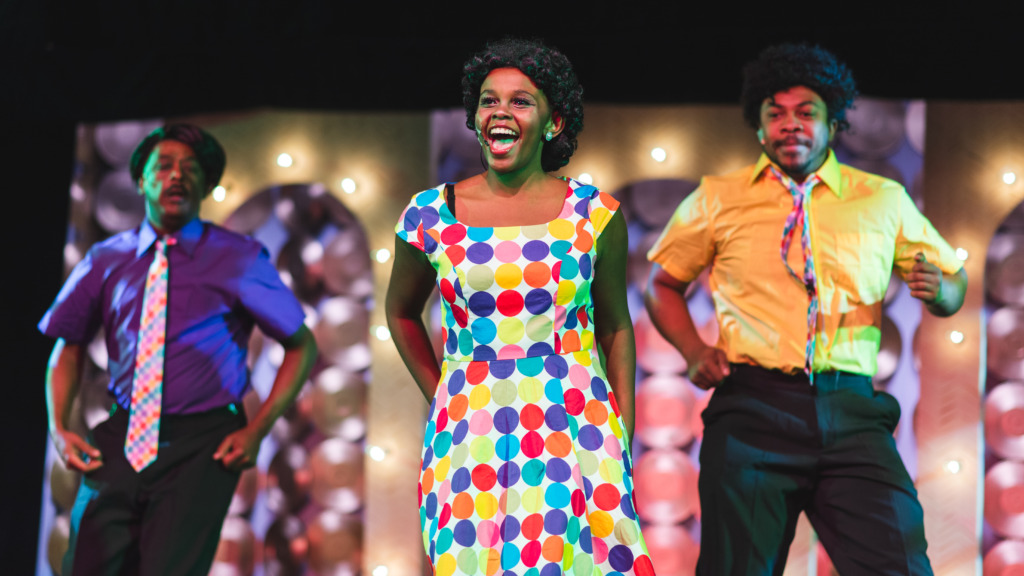
The ensemble is paying their dues all throughout the performance, creating backing vocals, adding harmonies and enthusiasm (all under the skilled eye of Musical Director Stephanie Carlock) and they feel as if they could all be leading players. All of the ensemble double up with little singing moments (as ‘names’ with hits from history) and its an excellent use of these talented performers all across the board. Featuring Julian Archer, Nathan Cooley, Paula Diggs-Smith, Zach Dodson, Eva Grove, Myles Hamilton, Natalie Knox, Donnie Lewis, Gracious Ndungu, Lisa Rigsby-Geiger, Tigga Smaller, and Josh Willmore, you get to see this group of singing, dancing, character-swapping actors popping up all over the place. Zach Dodson and Josh Willmore get several chances to croon/sing their way into your hearts, particularly when they’re playing as The Righteous Brothers doing “You’ve Lost That Loving Feeling.” And Tigga Smaller, Paula Diggs-Smith and Gracious Ndungu comprise the Shirelles, with each of these lovely ladies getting their chances to shine at solo song moments. Ndungu, who we’ve mentioned plays Little Eva, really explodes with charm and vocal power during “Locomotion” as well. And its moments like these, all throughout the performance where you get to see the dedicated labors and performance skillset that these ensemble members possess.
Taking up the mantle of the mouthy but lowkey maternal mother, Genie Klein, is Eva Grove. That mothering Brooklyn accent is spot-on and her fussy, nagging behaviors are perfect for the stereotype that is written into the character. While Grove’s character isn’t given any solo-type music per say, she sets the tone of the character right from her opening moment, where she’s plinking away on the piano, pauses to smoke her cigarette, and then just keeps the cigarette in her mouth as she goes back to playing. There’s just something about that moment that sets the comedic undertones of the ‘Ma’ character (as Carole refers to her) which gives you that punch of humor whenever she’s nagging about on stage.
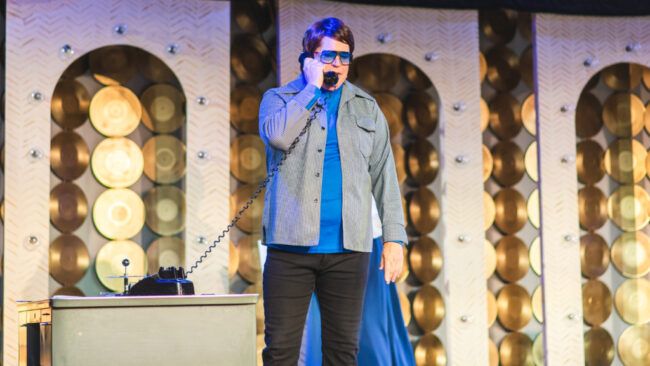
You can’t call Don Kirschner a fifth wheel, especially not with Mark Briner in the role, but he’s that spare tire in the four-way configuration of Carole, Gerry, Barry, and Cynthia. Briner is breezing through the role with a surprisingly contained energy that really reads clean on stage and gives the character just that little hint of ‘larger-than-life.’ It would be easy to try and make this the ‘Donnie Kirschner Show’ but Briner does a beautiful job of balancing his moments of arrival, text delivery, and he adds a really lovely and smooth series of harmonies when he does sing at the end with Carole, Cynthia, and Barry. What’s most amusing and enjoyable about Briner’s portrayal isn’t the slick-speed and perfect patois with which he delivers this radio-city-hot-shot-producer talk or even that striking hair and crazy costume combo, it’s the way he just arrives into a scene. Like you fully hear, inside your head, eight beats of theme music that accompanies the Don Kirschner character because Briner just brings it with his presence. It’s not too over the top but hardly dull and there’s a swagger to his movements, whether he’s standing and judging, or spouting out those double-back compliments. It’s really a marvelous portrayal and a perfect balance of being that supporting-character-man-role.
A breath of quirky fresh air, Heather Wadler slides into the skin of Cynthia Weil and you’d never know she wasn’t just some modern-day actress playing a part. She’s spunky and quirky, filled with all the peps of a woman pushing modernity of the time. (You never feel like she’s 2023 modern but like a half-year ahead of whatever year they’re in because she’s just that fresh and upcoming.) Wadler understands comic timing, even more so when she’s quipping with Barry Man, but we’ll get to their dynamic chemistry and interactions in a minute. Wadler has a voice that’s really suited for both the lyrical sound and overall musical style of this musical and she’s just breathing effervescence into the role, into her scenes, and into her songs. Even when she’s glum with that line about “You and Gerry had a fight so we had to have one bigger.” you get the sense that she’s just going to take it on the chin and make the best of it. It’s a wild energy and a perfect fit for the main quartet in the show.
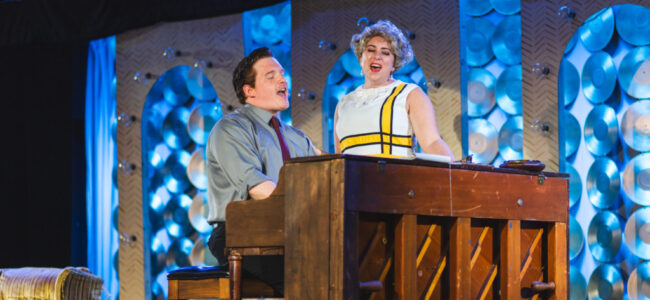
When Wadler is playing with Barry Mann (Austin Barnes) it’s a whole lot of amazing; they’re perfect in all the rooms! Wadler and Barnes have this natural, indescribable love-hate chemistry. The love is there, the barbs and the ribbing and all the quirky over-talk just flows naturally between them. They just build up each other’s humanity and each other’s hilarious quirky characters. When Barnes ‘slow-codes’ “Lost That Loving Feeling” trying to get a rise out of Wadler’s Cynthia in that startup to that song (which eventually transfers its way over to the crooning, hammy, delightful duet with Zach Dodson and Josh Willmore) it’s just hilarious. They get each other. And it’s perfect.
Barnes is bringing an A-game to this role. Barry Mann, not unlike Don Kirschner, has the potential to be a caricature and way over-the-top. But Barnes finds a mellowness to him, a truthfulness, without sacrificing or compromising the comedy of the character. Barry Mann is a hypochondriac and that’s threaded consistently throughout his existence but it never dominates into something that’s so campy it feels like its part of another performance. Barnes also has a stellar singing voice which is perfectly suited for these songs of classic yesteryore. He brings a charm and an understated charisma to the role while really understanding the humanity of it, particularly when trying to compete with the infamous ‘Gerry & Carole’ as the other team of ‘Barry & Cynthia.’
While at first one might be skeptical of such a young actor playing Gerry Goff, Stanley Evans obliterates any doubts with his stellar performance. He looks insanely young when he first meets Carole King, which is the way its supposed to be as he’s a few years older than the then-16 titular role. But its apparent quite quickly that his baby-boy face is going to stay perpetually youthful as all the other characters age around him. Evans gives a mercurial performance in the role, going from this balanced, happy-go-lucky teenager to this unhinged, unstable adult who just cannot keep it together because of his intrinsic fear of missing life as it flies by him. You get this shaky, uneasy portrayal as Evans grows into the adult Gerry, which really drives the tension between Gerry and Carole as their lives transform at warp-speed from teens to ‘married with kids’ and ‘hot-shot song writers’ all in the blink of an eye. Evans’ voice is superb. From the endearing “Some Kind of Wonderful” to the haunting “Up on the Roof” you get a prominent showcase of Evans’ versatility and the tempestuous chemistry that he shares with Carole King (Julie Parrish) is livelier than a lightning strike on a live wire.
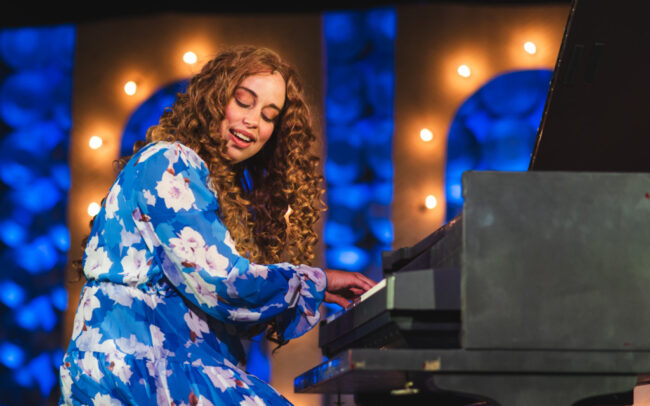
When you’re tackling the title role of a biopic musical, you better look, sound, feel, and be that historic musical icon. Julie Parrish nails it. And still manages to bring her own spirit, sound, and performance to the forefront. It’s an astonishing feat to stay true to the historical figure in a way that convinces the audience you are Carole King while still being present, being emotionally open and honest, and delivering a powerhouse performance that is solely yours, and it is a feat that Parrish accomplishes unquestionably. Everything from the Brooklyn-brusque accent in the beginning to the emotional inferno-blast of “One Fine Day” as the Act I finale, you’ll be amazed and stunned and utterly blown away. Parrish is convivial and congenial and just earnest in her approach to the role. She’s not trying to act as or even be Carole King, she’s sharing a consciousness of a musical great, spinning a little individuality into the narrative, and telling a story like nobody’s business. It’s remarkable, it’s sensation; it’s beautiful. There is an undeniable vibrance and vivacity present in Parrish at all times, even when it looks like her soul-candle is about to be extinguished. That flickering flame of resilience burns eternal in her eyes, in her body language, and certainly in her voice. (And her piano-playing movements are exquisitely accurate.)
When Parrish slips into “It’s Too Late”, which is near the end of Act II, you get this striking sense of closure and conclusion for that chapter of Carole King’s life; it’s bittersweet and truly beautiful. (I know that word keeps reappearing but it has never felt more startlingly accurate than for this production of this show.) You get the heartwarming, crowd-pleasing moment when Parrish, Barnes, Wadler, and Briner come together around the piano like four true friends, singing “You’ve Got A Friend” and their perfect quartet of sound, blending those four impressive voices together to carry the emotional current of that number out into the house is phenomenal. Parrish nails the role from start to finish, and when she finally lets herself go in “You Make Me Feel” it is this unrelenting, cleansing catharsis that just sets her spirit soaring. It’s magical. Julie Parrish and the cast of Beautiful are exactly that.
There are just so many wonderful things to be said about this production. It ticks all the boxes, it feels good, it’s happy nostalgia and a new story for those that don’t know the music. It’s practically perfect in its production, and it truly is its namesake. But perhaps the best thing of all that can be said about Tidewater Players’ Beautiful: The Carole King Musical is that you need to get tickets to see it. It’s the area premiere, it’s a sensational production, and it gives you all the right feel-good-feelings in the cockles of your heart and soul.
Running Time: Approximately 2 hours and 20 minutes with one intermission
Beautiful: The Carole King Musical plays through October 1st 2023 with Tidewater Players in residence at the Cultural Center at The Havre de Grace Opera House— 121 N. Union Street in historic downtown Havre de Grace, MD. For tickets call the box office at 667-225-8433 or purchase them online.
* Orchestra at this performance includes Stephanie Carlock as conductor and on key1, Joseph Carey on bass, Mark Leppo on drums, Paul Walton & Joshua Baker on guitar, Chris Rose on keys2, Jillian Laakso & Ayanna Posipanko on trumpet, Rachel Butera on reeds1, and Paula Carey on reeds2.
